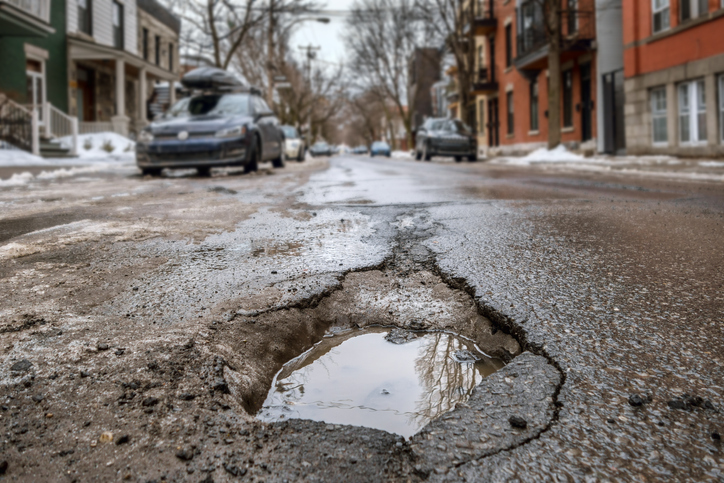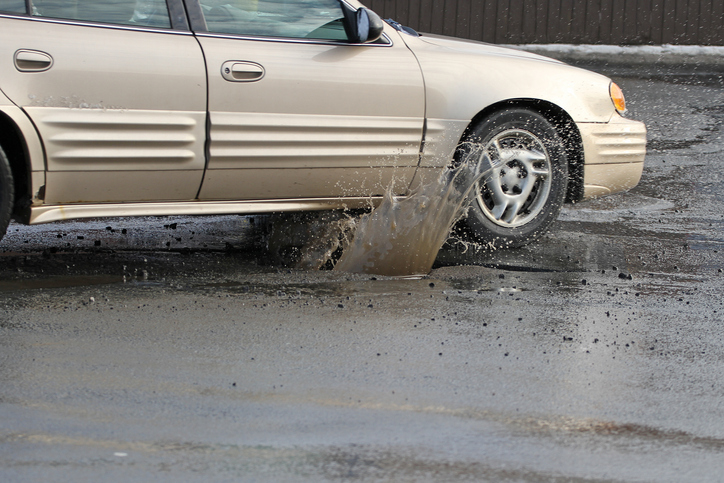
Potholes may seem harmless at first glance – after all, they’re just little holes in the road, right? Tell that to the countless car owners who’ve experienced costly car damage from crossing paths with them.
So where exactly do potholes come from? They’re created when water leaks through cracks in the road. When this water freezes, it expands, putting upward pressure on sections of pavement. Rises in temperature cause the water to thaw, leaving gaps between the ground and the pavement and causing weak parts of the road to collapse when cars drive over them. This collapsed section of road is what we call a pothole. Often worse in the springtime due to fluctuating temperatures, potholes can cause plenty of damage to a vehicle upon impact.
If you’re considering a career as a collision estimator, it’s important to understand the damage these road hazards can inflict on vehicles. Read on to discover five types of damage to look out for when a vehicle hits a pothole.
1. Those with Collision Estimator Training Should Check a Vehicle’s Tires for Damage
One of the most common types of pothole damage is found in car tires. This shouldn’t be surprising, as tires will be the first part of a vehicle to come into contact with a pothole. With significant impact, hitting one of these nasty obstacles can cause the air within a vehicle’s tires to shift. This change in air pressure may cause the tire’s sidewalls to bulge or even blow out. When a vehicle comes into the shop after a pothole incident, those with auto body estimator training can check for damage by jacking a vehicle up and inspecting each tire for signs of sidewall bulges, tread separation, and flats.
2. Tire Rims and Wheels Can Be Harmed by Potholes
While potholes can cause damage to tires, tire rims and wheels can also take a hit when a vehicle hits a pothole. The cracked or hard edges of potholes can cause damage to the sides of a wheel, in the area where the rim meets the tire. If this area is bent or cracked, it’s likely that the wheel will need to be replaced as it won’t be able to fully form a seal with the tires.
A vehicle’s wheel bearings can also become damaged from a pothole incident. These bearings help a vehicle’s wheels to smoothly rotate and turn. If a driver hears a grinding noise when attempting to turn their vehicle not long after driving over a pothole, this could be a sign that damage has been sustained to the wheel bearings.

3. Potholes Can Cause Exhaust System Damage
As those in auto careers might have guessed, the exhaust system is vulnerable to pothole damage due to the fact that exhaust pipes are attached to a vehicle’s underside. Hitting a pothole can dent the muffler, catalytic converter, or exhaust pipe. If a driver hears strange noises after hitting a particularly deep pothole, this may be a sign that a vehicle’s exhaust system has been damaged. In these cases, pros should be sure to check the system for holes in order to prevent harmful pollution from being emitted.

4. Suspension and Steering System Damage is Common
The suspension system absorbs the impact that results from a vehicle’s contact with the road, but hitting a pothole can affect suspension components such as the steering alignment system, ball joints or struts, and shocks. If a driver feels that their vehicle is pulling to one side or their steering wheel is vibrating, this could be a sign that the wheels have become misaligned. In the case of misalignment, drivers should have their vehicle attended to quickly, as a misaligned suspension can lead to premature wear.
5. A Vehicle’s Body Can be Affected by Potholes
Lastly, coming into contact with potholes can damage the body of a vehicle. Potholes can scrape against side skirts or bumpers, especially in vehicles that are lower to the ground. Although body damage doesn’t impact a vehicle’s ability to operate safely, in some cases, the cosmetic damage inflicted by potholes can be expensive to repair. In order to avoid such repairs, drivers should always be on the lookout for these nasty road obstacles—especially during pothole season!
Are you ready for a career as a collision estimator?
Your journey begins now. Get the training you need with ATC Surrey

